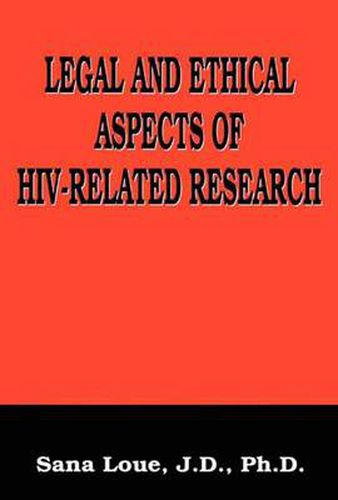Readings Newsletter
Become a Readings Member to make your shopping experience even easier.
Sign in or sign up for free!
You’re not far away from qualifying for FREE standard shipping within Australia
You’ve qualified for FREE standard shipping within Australia
The cart is loading…






This title is printed to order. This book may have been self-published. If so, we cannot guarantee the quality of the content. In the main most books will have gone through the editing process however some may not. We therefore suggest that you be aware of this before ordering this book. If in doubt check either the author or publisher’s details as we are unable to accept any returns unless they are faulty. Please contact us if you have any questions.
The motivation and inspiration for this book come directly from expe- ences with clients during the years that I practiced HIV-related law at the Legal Aid Society of San Diego, Inc. The issues discussed in this work reflect issues that arose on a recurring basis with clients participating in HIV research studies, with investigators calling for guidance on the legal implications of particular aspects of their proposed studies, and with research institutions and health care facilities struggling to make sense of legal maneuvers aimed at obtaining the records of their HIV-infected patients. It is impossible to thank each of these persons individually for their provocative questions and their insights. The discussion of ethical and legal issues relating to the design of clinical trials reflects questions raised during discussions with Donald J. Slymen, Ph.D. Don was one of the first researchers, in my realm of experience, to pay close attention to ethical concerns, and I am greatly appreciative of his contribution to both my professional growth and the development of various scenarios discussed in this text. The portions of this text dealing with confidentiality are the result of many hours of thoughtful discussion and analysis with Penn Lerblance, J.D., now deceased and still missed. Penn and I often participated together as presenters of in-service training programs for health prof- sionals. Penn addressed discrimination, and I focused on confidentiality.
$9.00 standard shipping within Australia
FREE standard shipping within Australia for orders over $100.00
Express & International shipping calculated at checkout
This title is printed to order. This book may have been self-published. If so, we cannot guarantee the quality of the content. In the main most books will have gone through the editing process however some may not. We therefore suggest that you be aware of this before ordering this book. If in doubt check either the author or publisher’s details as we are unable to accept any returns unless they are faulty. Please contact us if you have any questions.
The motivation and inspiration for this book come directly from expe- ences with clients during the years that I practiced HIV-related law at the Legal Aid Society of San Diego, Inc. The issues discussed in this work reflect issues that arose on a recurring basis with clients participating in HIV research studies, with investigators calling for guidance on the legal implications of particular aspects of their proposed studies, and with research institutions and health care facilities struggling to make sense of legal maneuvers aimed at obtaining the records of their HIV-infected patients. It is impossible to thank each of these persons individually for their provocative questions and their insights. The discussion of ethical and legal issues relating to the design of clinical trials reflects questions raised during discussions with Donald J. Slymen, Ph.D. Don was one of the first researchers, in my realm of experience, to pay close attention to ethical concerns, and I am greatly appreciative of his contribution to both my professional growth and the development of various scenarios discussed in this text. The portions of this text dealing with confidentiality are the result of many hours of thoughtful discussion and analysis with Penn Lerblance, J.D., now deceased and still missed. Penn and I often participated together as presenters of in-service training programs for health prof- sionals. Penn addressed discrimination, and I focused on confidentiality.